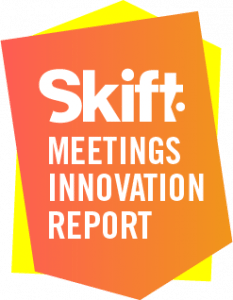Wi-Fi's Frustrating Lack of Progress at Events

Skift Take
 No matter how fun an event is or how great the after-parties are, attendees are typically there as part of their job. That means they probably need to get work done, whether it’s answering emails, researching reports, sending large files, or tracking and documenting what panels they attend. All of this is not possible without Wi-Fi — and yet Wi-Fi at events is often pretty terrible. It's frequently slow, spotty, and at certain times, seemingly nonexistent.
No matter how fun an event is or how great the after-parties are, attendees are typically there as part of their job. That means they probably need to get work done, whether it’s answering emails, researching reports, sending large files, or tracking and documenting what panels they attend. All of this is not possible without Wi-Fi — and yet Wi-Fi at events is often pretty terrible. It's frequently slow, spotty, and at certain times, seemingly nonexistent.
Although the situation has improved over the years, it hasn’t improved all that much. People are still complaining about the same basic problems as they were 10 years ago. This is especially true at large events, where huge convention centers and throngs of people make setting up a working network nearly impossible.
Tim Pozar, vice president of the San Francisco Metropolitan Internet Exchange, talked to Skift about how Wi-Fi actually works and why it presents a unique challenge to event organizers. Meanwhile, Ian Framson, co-founder of internet service provider Trade Show Internet, discussed the steps planners can take to reduce the chance of bad Wi-Fi.
Check out this story, and many more, below.
If you have any feedback about the newsletter or news tips, feel free to reach out via email at ic@skift.com or tweet @ikcarey.
— Isaac Carey, Travel Reporter
The Future of Events and Meetings
 Why Is Wi-Fi at Events Still So Bad? A lot of the same issues that plagued conference Wi-Fi 10 years ago are still around today, even as good internet becomes more and more of a necessity.
Why Is Wi-Fi at Events Still So Bad? A lot of the same issues that plagued conference Wi-Fi 10 years ago are still around today, even as good internet becomes more and more of a necessity.
Hotels Are Finding Cheaper Ways to Connect to Tech Vendors: Hotel tech innovation has been partly hampered by high tolls that property management systems charge for accessing critical data. Impala, Hapi, and other companies hope to bring that connectivity cost down, which could be a windfall for vendors.
MGM Resorts Leads U.S. Travel Sector With Job Cuts So Far in 2019: The U.S. is enjoying a tight labor market. But not every company is thriving. Data exclusively compiled by outplacement firm Challenger, Gray & Christmas reveals the most notable job cutbacks in 2019 by companies in the hotel, attractions, airline, and airport sectors.
Around the Industry
Asian Resorts Drive Forward in Being Green: Beyond the glare of overdevelopment, Asia’s resorts want to be a pioneer of the sustainability movement. Here’s how they say they will do that.
Budget Hotels Drive Southeast Asia’s Online Travel Growth to $34 Billion: Like low-cost carriers before them, low-cost hotel chains are playing a big role in the growth of online travel in Southeast Asia, according to a new Google report.
The Impact of Brexit on the Travel Industry: New Skift Research: The UK is an important contributor to global travel, but the uncertainty over Brexit will impact its place in the world and its residents’ willingness to spend on international vacations. The questions are just how and where the impact will be felt most.
Subscribe
Travel Reporter Isaac Carey [ic@skift.com] curates the Skift Meetings Innovation Report. Skift emails the newsletter every Wednesday.




